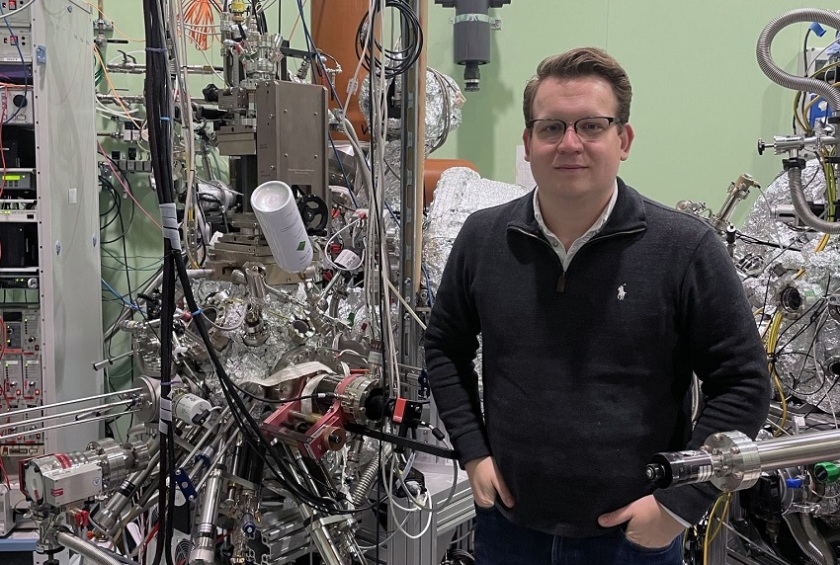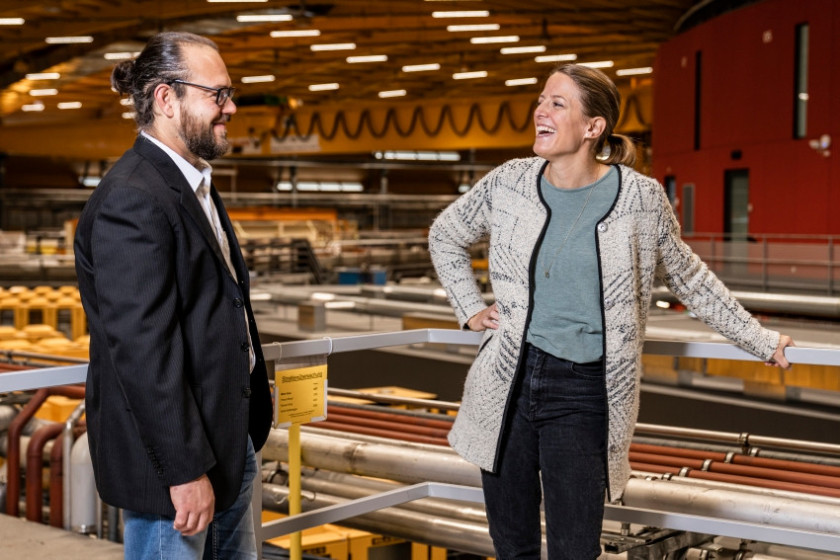Ernst Eckhard Koch Prize and Innovation Award on Synchrotron Radiation

Dr Fredrik Johansson (Institut des NanoSciences de Paris, CNRS, Sorbonne) receives the Ernst Eckhard Koch Prize for his outstanding dissertation. © F.J.

The prize for innovation in synchrotron research went to Professor Marianne Liebi and Dr Manuel Guizar-Sicairos, both from the Paul Scherrer Institute (PSI), Switzerland. © PSI
This year, the Friends of HZB awarded the Ernst Eckhard Koch Prize to the outstanding doctoral thesis of Dr Fredrik Johansson (Institut des NanoSciences de Paris, CNRS, Sorbonne). The European Innovation Award on Synchrotron Radiation went to Professor Marianne Liebi and Dr Manuel Guizar-Sicairos, both from the Paul Scherrer Institute (PSI, Switzerland). The award ceremony took place at this year's HZB user meeting, which had to be held digitally again this year and attracted nearly 400 participants.
The chairman of the Friends of HZB, Professor Mathias Richter, guided the award ceremony on screen. Six high caliber nominations were up for selection this year for the Ernst Eckhard Koch Prize.
Ernst Eckhard Koch Prize 2021
The Ernst Eckhard Koch Prize went to Dr Fredrik Johansson (now Institut des NanoSciences de Paris, CNRS, Sorbonne) for his dissertation at Uppsala University on "Core-hole Clock Spectroscopy Using Hard X-rays - Exciting States in Condensed Matter".
"Overall an exceptional dissertation achievement" said the expert jury, highlighting the number of Johansson’s high-quality scientific publications. "Also impressive is the demonstration of orbital and directional selectivity in ultrafast charge transfer in SnS2 using core-hole-clock," the jury said. Johansson then presented the method in a clear and concise talk: it allows a precise measurement of charge transfer times in different solids and promises deeper insights into solar cells, for example.
Innovation Award on Synchrotron Radiation 2021
The Innovation Award on Synchrotron Radiation 2021 went to Professor Marianne Liebi and Dr Manuel Guizar-Sicairos, both from the Paul Scherrer Institute (PSI), Switzerland. They developed and implemented a method to obtain information about textures in materials on the nanoscale from small angle scattering data using mathematical methods (Small Angle Scattering Tensor Tomography). The expert jury emphasised that this method is now used at many synchrotron sources and has opened the door to fascinating studies of hierarchical structures in life and materials science. The laudation was given by Professor Gabriel Aeppli, Head of the Photon Science Division at PSI. The Innovation Award on Synchrotron Radiation is endowed with 3000 € and is sponsored by SPECS GmbH and BESTEC GmbH.
red.
https://www.helmholtz-berlin.de/pubbin/news_seite?nid=23275;sprache=en
- Copy link
-
What Zinc concentration in teeth reveals
Teeth are composites of mineral and protein, with a bulk of bony dentin that is highly porous. This structure is allows teeth to be both strong and sensitive. Besides calcium and phosphate, teeth contain trace elements such as zinc. Using complementary microscopy imaging techniques, a team from Charité Berlin, TU Berlin and HZB has quantified the distribution of natural zinc along and across teeth in 3 dimensions. The team found that, as porosity in dentine increases towards the pulp, zinc concentration increases 5~10 fold. These results help to understand the influence of widely-used zinc-containing biomaterials (e.g. filling) and could inspire improvements in dental medicine.
-
Fascinating archaeological find becomes a source of knowledge
The Bavarian State Office for the Preservation of Historical Monuments (BLfD) has sent a rare artefact from the Middle Bronze Age to Berlin for examination using cutting-edge, non-destructive methods. It is a 3,400-year-old bronze sword, unearthed during archaeological excavations in Nördlingen, Swabia, in 2023. Experts have been able to determine how the hilt and blade are connected, as well as how the rare and well-preserved decorations on the pommel were made. This has provided valuable insight into the craft techniques employed in southern Germany during the Bronze Age. The BLfD used 3D computed tomography and X-ray diffraction to analyse internal stresses at the Helmholtz-Zentrum Berlin (HZB), as well as X-ray fluorescence spectroscopy at a BESSY II beamline supervised by the Bundesanstalt für Materialforschung und -prüfung (BAM).
-
Element cobalt exhibits surprising properties
The element cobalt is considered a typical ferromagnet with no further secrets. However, an international team led by HZB researcher Dr. Jaime Sánchez-Barriga has now uncovered complex topological features in its electronic structure. Spin-resolved measurements of the band structure (spin-ARPES) at BESSY II revealed entangled energy bands that cross each other along extended paths in specific crystallographic directions, even at room temperature. As a result, cobalt can be considered as a highly tunable and unexpectedly rich topological platform, opening new perspectives for exploiting magnetic topological states in future information technologies.
